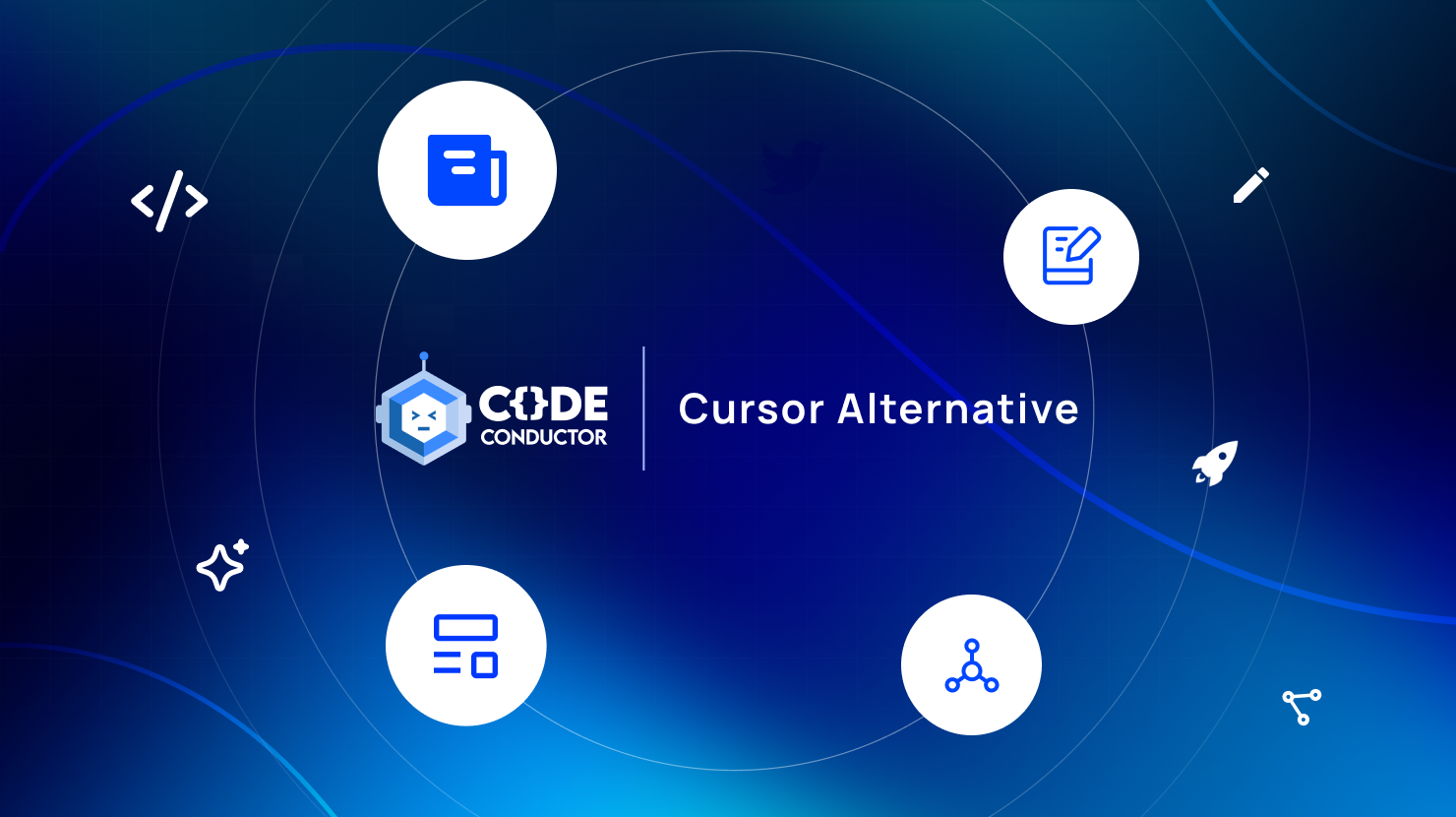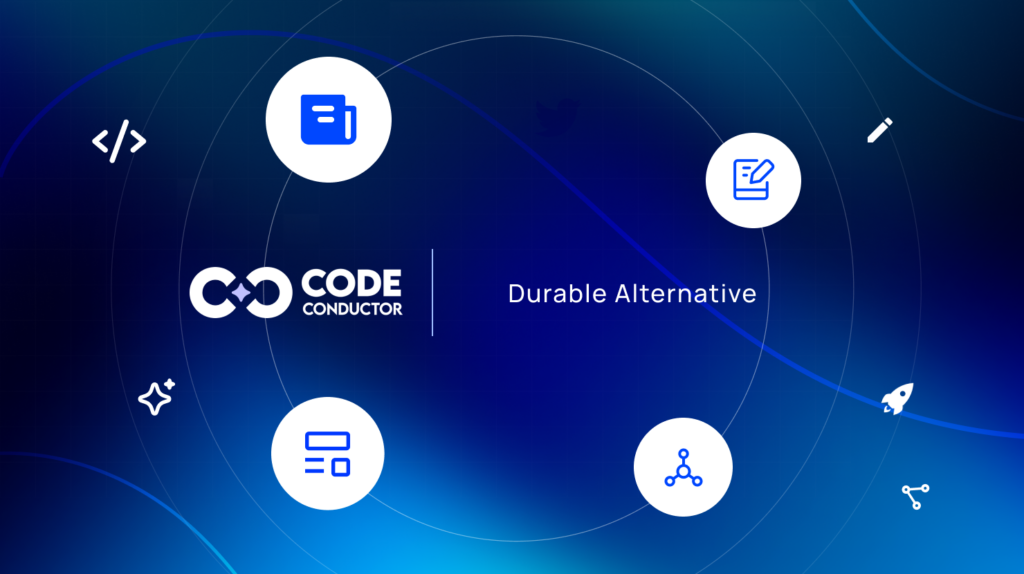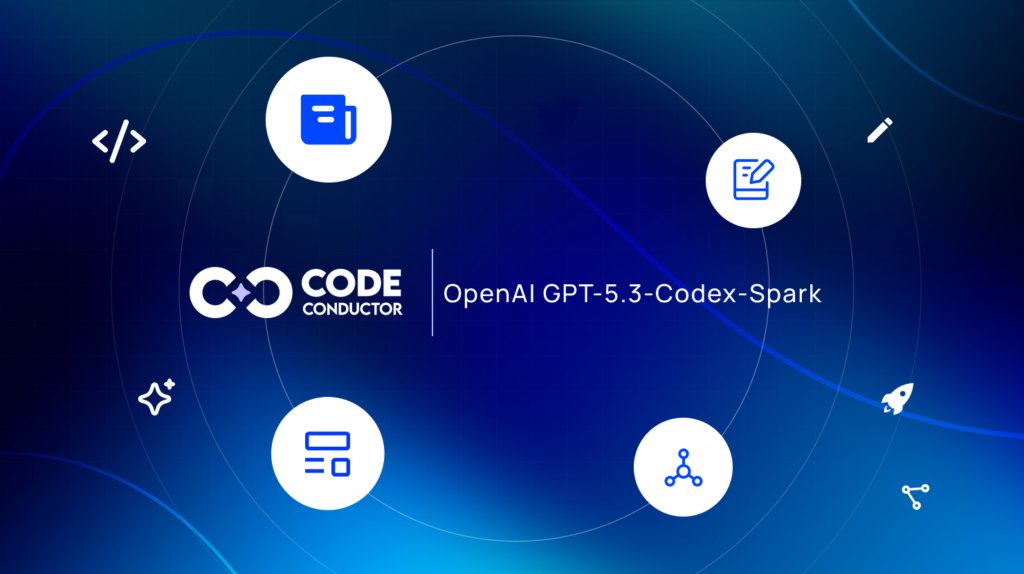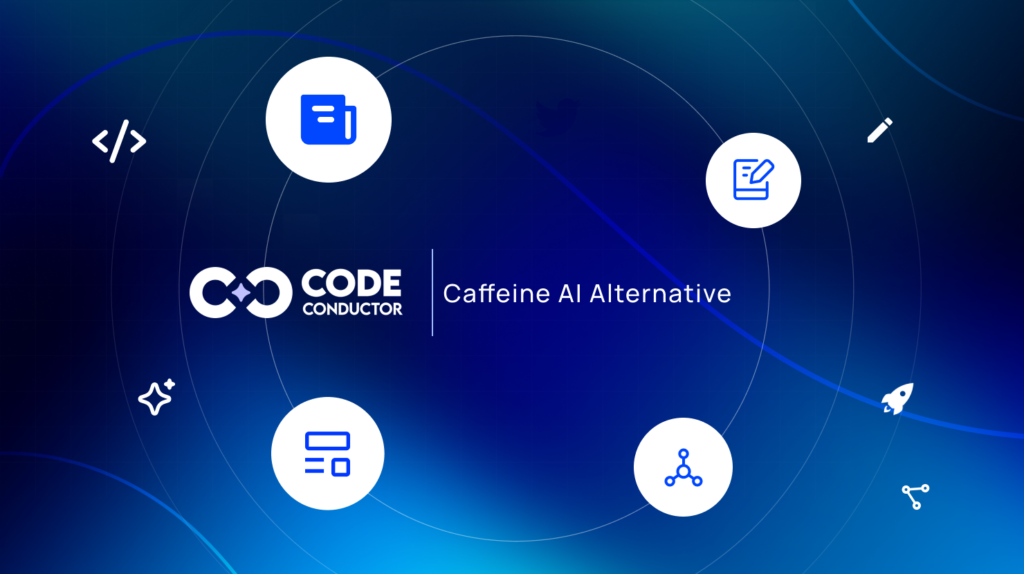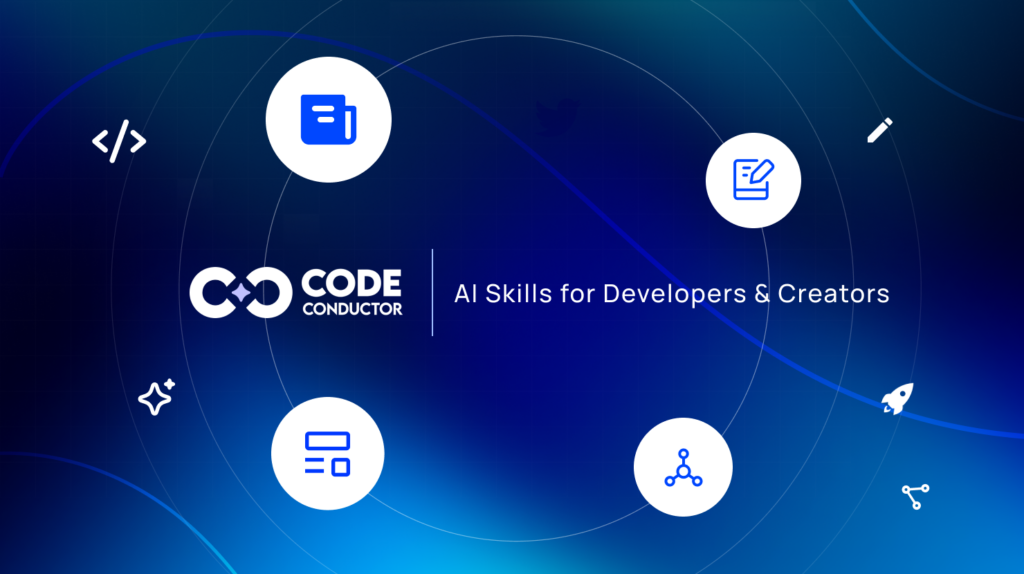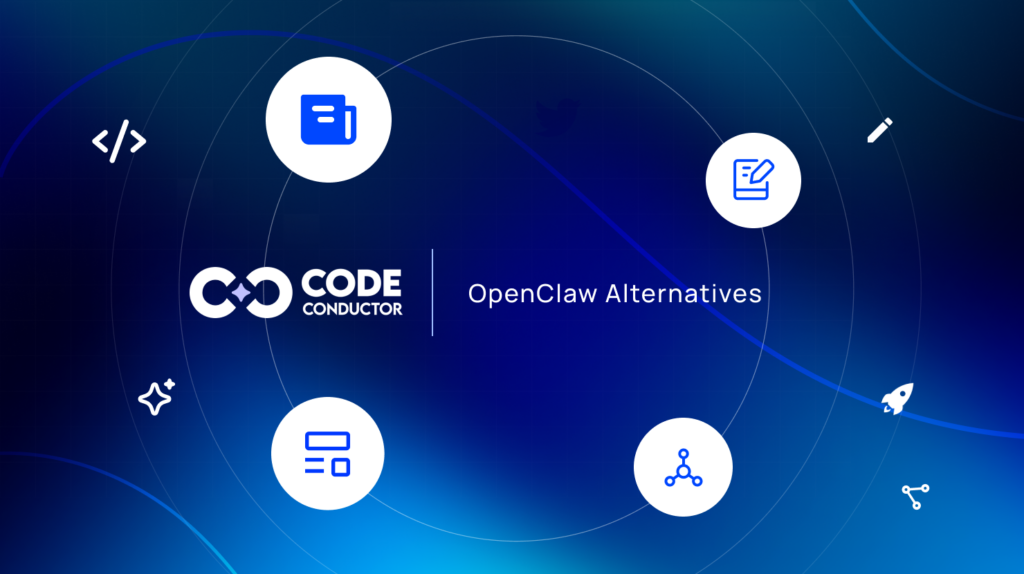Share at:
AI is no longer an accessory to software development, it’s the engine driving how modern teams design, build, and scale digital products. In 2026, platforms like Cursor offer AI-augmented coding within familiar IDEs, empowering developers to move faster and reduce repetitive tasks.
But as development shifts from code writing to AI-native system design, the needs of forward-thinking teams outgrow stateless editors. Building apps with long-term memory, automated workflows, and real-time integrations demands more than just intelligent autocomplete.
This is where CodeConductor.ai steps in as the best alternative to Cursor AI for teams building AI-native applications. Unlike Cursor, which offers session-bound code assistance in IDEs, CodeConductor supports persistent memory, multi-agent orchestration, and API-connected workflows. It’s purpose-built for engineering teams, SaaS builders, and enterprises needing full-stack AI development—from code to production deployment.
In This Post
- What Is Cursor AI and What Does it Offer?
- Why Look Beyond Cursor?
- Looking for the Best Cursor Alternative in 2026?
- Cursor vs CodeConductor.ai: Deep-Dive Feature Comparison
- Reddit Insights
- Cursor vs CodeConductor: Which Is the Best AI Code Editor in 2026?
- Real Feedback: What Users Say About CodeConductor.ai & Cursor
- In a Nutshell: The Best Alternative for Cursor in 2026?
- Cursor Alternative FAQs
- What is Cursor AI?
- Is there a better alternative to Cursor?
- How to build AI workflows?
- Can I build SaaS workflows using CodeConductor?
- What’s the best AI platform for building internal tools?
- Is there a no-code platform with persistent AI memory?
- Which AI platforms offer cross-session memory for agents?
- Can I use CodeConductor to build ChatGPT-powered bots with API access?
- What’s the best visual agent builder with role-based access?
- What’s better than Cursor for building production-ready AI systems?
- Can CodeConductor help non-technical teams build AI workflows?
- How do I migrate from Cursor to a scalable AI platform?
- Top AI Platform Alternatives You Shouldn’t Miss in 2026
What Is Cursor AI and What Does it Offer?
Cursor AI, developed by Anysphere, , is a modified version of Visual Studio Code (VS Code) infused with advanced AI capabilities. It delivers AI-assisted code generation, inline completions, and natural language commands directly inside the IDE, helping developers write and refactor code more efficiently.
Key Features of Cursor ai:
-
Multi-line Tab Completions: Quickly expand logical code blocks using intuitive “Tab, Tab, Tab” navigation.
-
AI Chat Panel (Ctrl+L): Interact directly with your codebase using natural language prompts.
-
Refactor & Rewrite: Restructure functions, classes, and logic via conversational commands.
-
Command Generator: Convert plain English instructions into executable terminal commands.
-
Semantic Code Search: Locate functions, symbols, and files using contextual AI memory.
-
SOC 2 Privacy Mode: Keep your codebase secure with offline AI processing and data isolation.
-
Plug-in Compatibility: Import all your VS Code extensions seamlessly.
-
Model Flexibility: Supports GPT-4, Claude, and proprietary models for adaptable use.
Cursor is ideal for developers seeking an AI-native experience within their IDE, making it one of the most recognized tools in the AI coding assistant category.
Why Look Beyond Cursor?
While Cursor offers a smooth AI coding experience, it’s limited by session-only context and lacks features essential for complex, stateful applications. For development teams building multi-agent workflows, integrating external APIs, or deploying secure applications, Cursor may fall short.
Limitations of Cursor AI:
-
No persistent memory between sessions
-
Limited logic handling (no branching or long-term state)
-
Not built for app orchestration or backend integration
-
Single-device IDE dependency (no SaaS or on-prem orchestration)
-
Minimal DevOps or version control support
As projects scale beyond code completion and into AI-first architecture, developers often need more than what Cursor provides.
Looking for the Best Cursor Alternative in 2026?
If you’ve been relying on Cursor for AI-assisted coding, you already know how useful it is for generating and refactoring code directly in your IDE. But for many teams, coding help is only the first step. As projects grow, developers need tools that don’t just write snippets of code—they need platforms that can design, orchestrate, and deploy full AI-native applications.
That’s where CodeConductor.ai stands out as the best Cursor alternative in 2026.
Unlike Cursor, which is primarily focused on code editing inside a desktop IDE, CodeConductor.ai takes a broader approach. It provides persistent memory so your applications can retain context across sessions, supports workflow logic and multi-agent orchestration, and comes with native integrations for APIs and webhooks without relying on plugins. Most importantly, it includes flexible deployment options, whether you prefer SaaS hosting, self-hosted infrastructure, or containerized environments.
In short, Cursor is excellent if you need an AI companion to help write and edit code. But if your goal is to build and scale real AI-driven applications with intelligent workflows, integrations, and deployment built-in, CodeConductor.ai is the clear upgrade.
Cursor vs CodeConductor.ai: Deep-Dive Feature Comparison
To decide which platform fits your AI roadmap, it’s essential to compare Cursor and CodeConductor.ai across core dimensions like memory, logic handling, integration capabilities, and deployment readiness.
| Feature | Cursor | CodeConductor.ai |
|---|---|---|
| AI Editing & Autocomplete | Yes (multi-line tab) | Yes (prompt + visual) |
| Refactoring & Rewrites | Yes | Yes, + logic flows |
| Persistent Memory | No | Yes (session + user context) |
| Agent Builder | Basic in-editor agent | Visual multi-agent builder |
| Workflow Logic (Branching) | None | Full conditional logic & state |
| API & DB Integrations | Via plugins only | Native support, SDKs, webhooks |
| Deployment Options | Desktop IDE only | SaaS, Self-hosted, Container |
| Ideal Use Case | Coding inside an IDE | Building AI-powered workflows/apps |
Reddit Insights
cursor ai vs openai o1 vs replit agent for buidling softwares?
byu/Munib_raza_khan inChatGPTCoding
Cursor vs CodeConductor: Which Is the Best AI Code Editor in 2026?
The right platform depends on your AI goals. If you’re looking to embed AI into your dev workflow with tight Git integration and real-time code suggestions, Cursor is a great fit. It excels in in-editor assistance, AI pair programming, and fast prototyping.
However, if your AI solution demands agent orchestration, external API workflows, or secure enterprise deployment, then CodeConductor.ai is the clearly superior choice.
Cursor: AI Coding Assistant for Developers in IDEs
Choose Cursor if your workflow is code-centric, prompt-driven, and tightly integrated within a traditional IDE environment. Cursor is built for developers who:
-
Use VS Code and want AI-native editing inside their editor
-
Need real-time code refactoring, inline completions, and secure local execution
-
Prefer single-file coding tasks, rapid prototyping, and no infrastructure overhead
Cursor excels in supporting AI pair programming, lightweight development tasks, and instant Git-assisted suggestions for faster iteration.
CodeConductor: AI Agent Platform for Application Builders
Use CodeConductor if you’re building AI-powered applications, not just writing code. CodeConductor is designed for teams that require:
-
Persistent memory, branching logic, and long-form agent workflows
-
Integration with external APIs, structured data inputs, and toolchain orchestration
-
On-premise deployment, version-controlled environments, and full scalability
CodeConductor supports multi-agent systems, dynamic task flows, and enterprise-grade AI operations, making it ideal for complex, secure, and production-ready use cases.
Real Feedback: What Users Say About CodeConductor.ai & Cursor
CodeConductor User Review:
Francesca C. – “CodeConductor has helped our team maintain professional conduct and compliance in cross-border communications. The memory and orchestration capabilities are unlike any other platform we’ve used.”
Benefits:
-
Ensures regulatory alignment across jurisdictions
-
Assists with sensitive client interactions and legal protocols
-
Guides behavioral norms within corporate frameworks and team dynamics
Cursor User Review:
In a Nutshell: The Best Alternative for Cursor in 2026?
In 2026, developers seeking AI coding assistants often start with Cursor for its fast, intuitive IDE integration. It’s ideal for quick edits, code suggestions, and lightweight prototyping.
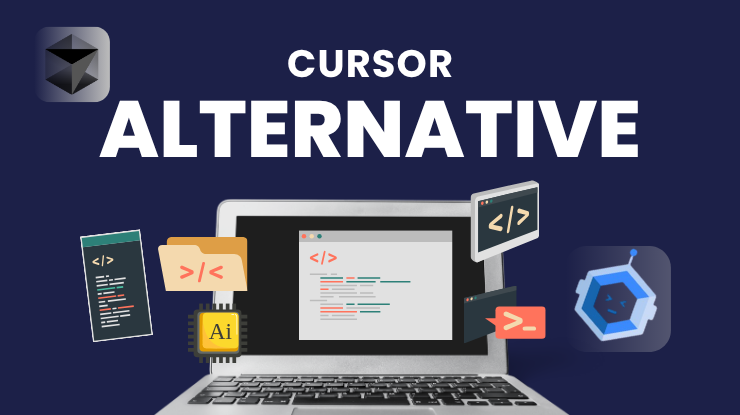
But when your roadmap calls for:
- Persistent memory and branching logic
- Multi-agent orchestration with external APIs
- Enterprise-grade deployment and compliance
Only CodeConductor.ai delivers the full AI platform experience.
It’s the go-to solution for engineering teams, AI-first startups, and enterprises building scalable, logic-driven AI systems—far beyond simple code completion.
Cursor Alternative FAQs
What is Cursor AI?
Is there a better alternative to Cursor?
Yes, CodeConductor offers persistent memory, multi-agent orchestration, and deployment options that Cursor lacks.
How to build AI workflows?
Use CodeConductor to deploy programmable agents with visual builders, integrated APIs, and logic branching.
Can I build SaaS workflows using CodeConductor?
Yes, CodeConductor is ideal for SaaS product teams needing agent-based automation, memory handling, and external API orchestration.
What’s the best AI platform for building internal tools?
CodeConductor.ai lets teams build smart internal tools with role-specific agents, memory, logic trees, and secure deployment features.
Is there a no-code platform with persistent AI memory?
While CodeConductor uses low-code structures, it supports long-term memory, multi-agent orchestration, and visual workflow logic out-of-the-box.
Which AI platforms offer cross-session memory for agents?
CodeConductor supports cross-session memory via persistent context layers, enabling agents to retain user history and state logic.
Can I use CodeConductor to build ChatGPT-powered bots with API access?
Absolutely. CodeConductor supports native API and webhook integrations for building AI bots that access real-time business data.
What’s the best visual agent builder with role-based access?
CodeConductor features a visual agent builder with support for RBAC, audit trails, and deployment logs—ideal for enterprise teams
What’s better than Cursor for building production-ready AI systems?
CodeConductor is better for production-grade AI because it supports memory, branching logic, and enterprise deployment—beyond IDE code editing.
Can CodeConductor help non-technical teams build AI workflows?
Yes. CodeConductor provides a visual configuration layer, making it accessible to non-developers while still supporting advanced logic.
How do I migrate from Cursor to a scalable AI platform?
Transitioning from Cursor to CodeConductor involves redefining your logic workflows, importing data structures, and configuring agents with persistent context.
Best Cursor AI Alternative – Try it Free
Top AI Platform Alternatives You Shouldn’t Miss in 2026
Share at:

Founder CodeConductor

